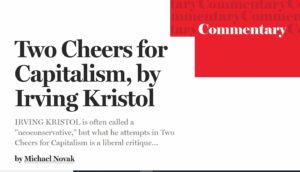Writing an Obituary for Neocons

 The New York Times obituary of neocon historian Gertrude Himmelfarb shows why neoconservatives remain a potent political force in U.S. politics: many liberals can’t imagine a socialist challenge to capitalism that doesn’t apologize for authoritarianism.
The New York Times obituary of neocon historian Gertrude Himmelfarb shows why neoconservatives remain a potent political force in U.S. politics: many liberals can’t imagine a socialist challenge to capitalism that doesn’t apologize for authoritarianism.
The NYT’s sentimental gloss of Himmelfarb’s life avoids mention of the actual positions she and her neconservative co-thinkers adopted that justified social inequality at home and slaughter abroad, from their anti-feminism and tirades against black liberation to their endorsement of U.S. military invasions overthrowing democratically elected governments, as in Chile. In contrast, Himmelfarb’s one-time comrades, Phyllis and Julie Jacobson, who founded and edited New Politics, dedicated their political activity and intellectual work to a consistent defense of democracy, social equality, and peace—a worldview the NYT and many liberals can’t fathom.
Ironically, it was Phyllis Jacobson who “recruited her childhood friend… Gertrude Himmelfarb, to the movement,” as Barry Finger notes in his obituary of Phyllis. But unlike Himmelfarb and the Commentary set, the Jacobsons “accommodated their views to fit no political fashion; to curry favor neither with academia nor with any left mainstream. They fought against the war in Vietnam, without succumbing to illusions about Ho Chi Minh and the NLF; they struggled against American intervention in Nicaragua, without closing their eyes to the Sandinistas’ infringements on democracy; they fought against CIA-inspired overthrow attempts of Castro, while exposing the Castro regime’s repressive anti-democratic nature. They engaged the struggle for democratic unions, while condemning racism both in the ranks and in leadership policies of the labor movement. And they saw no contradiction in fighting for both at once.”
In its utterly uncritical take on Himmelfarb, her husband Irving Kristol, and Commentary magazine, the mouthpiece of neoconservatism, the NYT obituary avoids any mention of their consistent, vicious efforts to discredit challenges to the capitalist status quo. In contrast, writing in New Politics, historian Martin Duberman noted how Himmelfarb, then chair of the CUNY Graduate School History Department, insisted he had no place in the Department because “sexual history wasn’t ‘real’ history at all; it had been spawned by political polemics, not scholarly necessity.” Duberman observes about Himmelfarb’s rebuke: “As if a scholar’s political and social views don’t always, consciously or not, color his/her narratives (Himmelfarb herself—a right-wing conservative—being among the more notorious current examples).” Duberman also recalls Himmelfarb warning that his “standing as a legitimate scholar… might well be at stake.”
The NYT obit ends with an apt quote from their friend and fellow neoconservative, Daniel Bell, who called the union of Himmelfarb and Kristol “the best marriage of our generation.” The quote, like the obit, with its expression of neoconservatives’ blind love (of capitalism) belonged in the Sunday weddings.